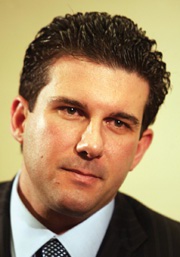Most financially broken businesses try to resolve their predicaments with foreclosure auctions and bankruptcy sales — public events with starting bids and published procedures.
In the alternative, equity owners of a drowning business may transfer control of their assets to a third party by selling bonds or the company’s bank loans. The buyers become the new debtholders with a claim to the company.
And then there was the recent $230.5 million sale of M Resort’s debt, worth $860 million on paper, to Penn National Gaming — financial wheeling and dealing that seemed to fall into a category of its own.
Bidders contacted by the Sun say they are unsure how to describe the process by which M’s lender, Lloyds Banking Group, solicited bids for its portion of the debt. Potential buyers submitted bids and then resubmitted them — in some cases, multiple times — without knowing what others were offering. For some bidders, the process felt like they were fumbling in the dark, at risk of being aced out by the competition.
M Resort CEO Anthony Marnell III called the process “incredibly frustrating for everyone involved.”
“The process went on and on and on,” he said. “At times it wasn’t very clear what was going on.”
(Marnell’s bid to buy the debt of his casino, backed by private-equity firm Leonard Green & Partners, was unsuccessful.)
•••
Related Stories
If Harrah’s Entertainment sells the Rio to raise cash, the company must sell it for at least $300 million. And if it sells for less than $425 million, the company must first use the proceeds to pay down a mortgage loan on the Rio.
The stipulations are part of negotiations with lenders who agreed to more favorable loan terms, including extending the maturity of a loan by up to two years and mandatory offers to repurchase loans at discounted prices, thus forgiving millions in debt.
The mortgage loan is part of a financing package used by private equity firms to achieve a leveraged buyout of the company in January 2008. Called commercial mortgage-backed securities, the loan was a form of cheap capital when real estate was booming and gives lenders the right to control a property if it defaults on debt payments. The downside for borrowers is that there are typically restrictions on the sale of properties included in the loan, giving lenders more security for their investment, said analyst Michael Paladino, senior director of gaming, lodging and leisure for bond rating agency Fitch Ratings.
Whether Harrah’s will sell the Rio isn’t clear. Some analysts suspect investors are making lowball bids while the economy is still depressed. Without the benefit of Harrah’s Total Rewards marketing program or its iconic World Series of Poker tournament, the resort may not earn as much under a new owner.
•••
Recession-battered casino workers who complain that their tips are down significantly can take consolation that the Internal Revenue Service, with little pressure from the industry, has lowered the amount they are taxed on their tip income.
Since the recession, the majority of Las Vegas casino workers who participate in the IRS’ voluntary tip compliance program are paying about 30 percent less in taxes on their tips.
Under the program, the IRS taxes tipped workers based on predetermined estimates of tips earned at particular hotels for certain shifts and jobs. It’s an immensely complex system that has nevertheless been a boon for both the IRS and workers. In return for participating in the voluntary program, casino workers don’t have to report tip earnings based on detailed workbook documentation of their daily tips. Rather than relying on workers to report tips that might go uncollected, the IRS receives millions in guaranteed taxes on tips.
At least once a year, casino executives and Culinary Union officials meet with the IRS to discuss the tip rates. They reduced rates in 2008 by about 20 to 25 percent and further lowered rates in 2009 by another 5 percent or so.



Join the Discussion:
Check this out for a full explanation of our conversion to the LiveFyre commenting system and instructions on how to sign up for an account.
Full comments policy